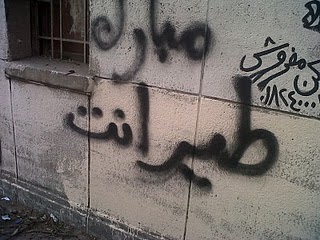Tarek Amr [1], a member of Global Voices’ Egypt team, has been offline since January 26, when the government forced most ISPs [2] to close shop.
Today, with the Internet back up [3], he shares his story [4]:
I didn't participate in the first day of the revolution. I was a bit scared, a bit not convinced that it will change anything, and also I prefer to follow such events on twitter and facebook instead of participating in them.
After the Internet was turned off, however, Tarek decided to venture out. He explains:
Two days later, the government switched off the mobile phones, the internet, blackberry, and all other means of communication. They thought that they might prevent people from communicating and arranging for further demonstrations. But the truth is that such information blackout [2] made me – as well as thousands of other people – eager more to get down to the streets and participate in the “Friday of Anger”.
Tarek shares his story from Friday, January 28, the “Day of Anger”:
Again, the police brutality didn't stop. Rubber bullets, tear bomb, and even lethal bullets were used in different places in Egypt. They were doing their best to prevent the protesters from crossing the bridges and going to Tahrir square. We tried different bridges in different areas, but we faced the same resistance from the police, till a curfew was announced and I preferred to go back to home, along with many others.
He shares a sentiment echoed by many Egyptians–the feeling of waiting:
In the following three days, all security forces and policemen dissipated from the streets. Protesters stayed in Tahrir Square calling for a million-persons protest/march on Tuesday. People at homes lived in a state of terror, where they carried sticks and knives every night and spent their nights in the streets protecting their homes and businesses. People also cleaned the streets by themselves, and protected some governmental and national buildings. During those three days, every visit you pay to Tahrir Square makes you believe that Mubarak should be now packing his stuff to leave the presidential palace, then a single glance on the national TV makes you believe he is getting himself ready for thirty more years inside the palace.
Tarek then expresses the uncertainty he is left with after days of revolt in his native Cairo:
And once more, I experienced Mubarak's roller coaster. I was happy after his speech. Although he didn't resign, but he promised not to run in the following presidential elections and promised to let the parliament fix the parts of the constitution that limit the presidential candidates to the members of the NDP or the ones approved by the party only. But after a while, I found myself wondering, isn't this just another manoeuvre by the president…
He concludes:
I'm still confused. I really can't tell if the revolvers have achieved at least a significant part of their demands, or the revolution was murdered. I am not the only one confused here, many protesters are confused too. Some are saying that they have to stay and calling for another demonstration next Friday, and some others are calling people to get back to their homes end those protests altogether. Nothing is sure yet, but I am just sure of one single thing, Egypt has changed. I still remember that poor lady I met in Tahrir who said something that summed the whole thing in few simple words. She told me, “A couple of days ago I was so scared of every single police soldier, and today I am here protesting against the head of the state”.


